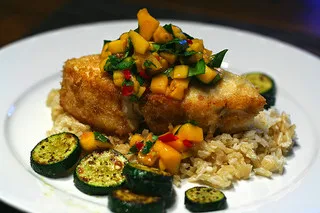Three Indian South African Pickle and Preserves Recipes
Salsa is so last week! Make three Indian South African pickle and preserve recipes with The African Gourmet. These beloved condiments — spicy mango relish, tangy lime pickle, and atchar vegetable pickle — blend African ingredients with Indian spice traditions brought by South Asian settlers to South Africa generations ago.

Spicy Mango Coconut Relish — a South African Indian favorite.
Spicy Curry Mango Coconut Relish
Use this relish in place of mustard, ketchup, or salsa. Sweet, hot, and rich in flavor, it’s a versatile condiment for meat, curry, or rice.
Ingredients
- 2 cups fresh coconut (or coconut flakes)
- 1 cup diced ripe mango
- 1 tablespoon red pepper flakes (optional)
- 1 cup chopped fresh parsley
- 1 teaspoon ground curry
- 1 teaspoon brown sugar
- ½ teaspoon salt
- ¼ teaspoon lime juice
- 1 cup plain yogurt
Directions
Mix all ingredients in a bowl and store in an airtight container in the refrigerator for at least 2 hours before serving.

Tangy lime pickle — salty, sour, and perfectly preserved.
Tangy Tender Lime Pickle
Limes make an excellent spicy condiment. Lime pickle combines salt, spice, and sunshine for a bold, long-lasting flavor.
Ingredients
- 6 limes, quartered
- 3 cups pickling salt
- 1 teaspoon turmeric powder
- 2 tablespoons chili powder
- 2 teaspoons fenugreek seeds
- 2 teaspoons mustard seeds
Directions
Choose ripe, unblemished limes. Wash, dip in hot water, and quarter. Soak in salt solution for 20–30 minutes, or layer with salt and ferment in the sun for 2–3 days. When softened, roast and grind the spices, then add to limes. Pack into jars, seal, and ferment for one month before serving. Store with a thin layer of oil on top to preserve freshness.

Atchar spicy vegetable pickle — hot, colorful, and full of crunch.
Atchar Spicy Vegetable Pickle
Try the best homemade Indian cuisine in South Africa. Atchar is a hot and spicy vegetable pickle that varies by region and vegetable availability.
Ingredients
- 2 cups carrots, diced
- 3 cups cabbage, chopped
- 2 hot peppers, diced
- 1 white onion, diced
- 2 teaspoons ground ginger
- 1 ½ tablespoons pickling salt
- 2 teaspoons curry powder
- 1 tablespoon olive oil
- 1 ¼ cups white vinegar
Directions
Wash and peel vegetables, then chop into small pieces. Lightly cook for 5 minutes and mix with fried onions, spices, salt, and vinegar. Heat for another 5 minutes. Fill sterile jars, seal tightly, and cool to room temperature.
Science Behind the Folklore
South African Indian pickling blends cultural wisdom with microbiology. Fermentation uses beneficial bacteria — like Lactobacillus — to transform fruits and vegetables into preserved superfoods. These microbes lower pH, increase vitamin content, and create the tangy, complex flavor that defines atchar, lime pickle, and mango relish.
Through African Science Folklore, these recipes reflect ancient food preservation methods that turned scarcity into abundance — a culinary chemistry lesson written in spice and sunlight.
Discover More Culinary Stories
Frequently Asked Questions About South African Pickles
What is the difference between relish and pickle?
Relish is sweet, chopped, and quick-cooked, while pickles are fermented or brined to develop deeper flavor. Both preserve vegetables, but pickles keep longer.
Why are Indian South African pickles special?
They merge African and Indian food history, combining tropical produce with bold spices introduced by Indian migrants during the 1800s.
How long do homemade pickles last?
Properly sealed and stored pickles can last 6–12 months. Always use sterilized jars and check for cloudiness or spoilage before eating.
Can I use vinegar instead of fermentation?
Yes, vinegar pickling (like atchar) is faster and still safe. It lowers the pH, preventing spoilage while maintaining bright color and spice.


























